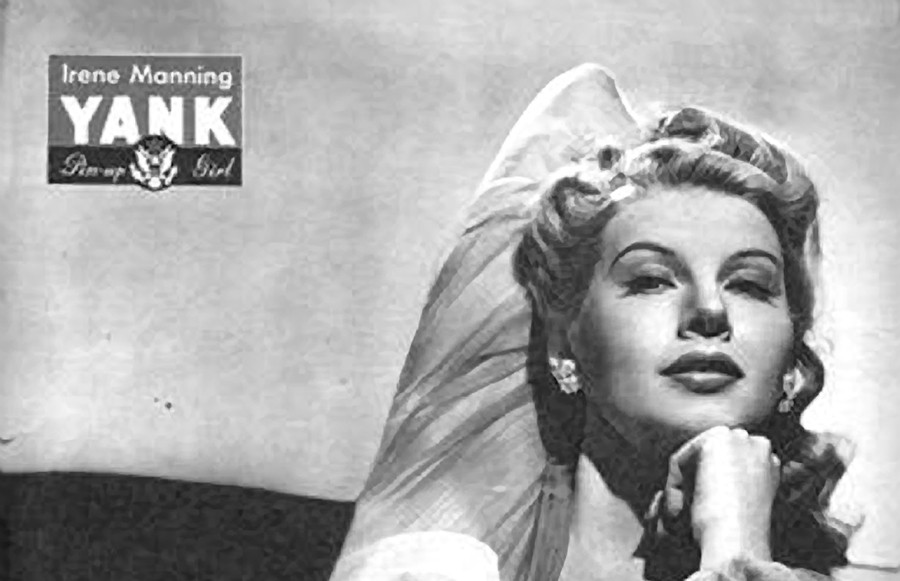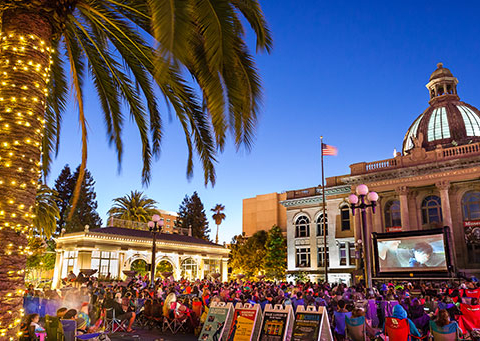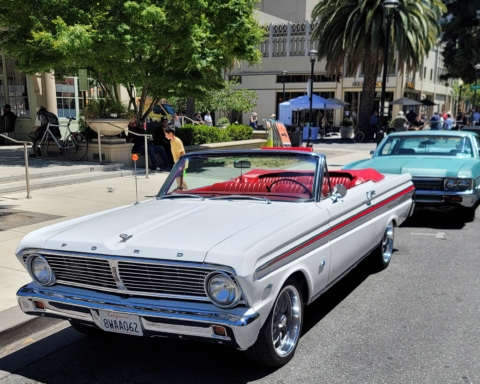I watched “Yankee Doodle Dandy” on July 4, and, inspired by Jimmy Cagney’s legendary performance, did some research. I learned that the iconic 1942 patriotic film also featured Irene Manning, who retired to San Carlos following what the New York Times called a “fleeting but stellar” career as a Hollywood leading lady during the war years of the 1940s.
The Times’ assessment came in its obituary for Manning, who was 91 when she died in San Carlos in 2004. Beyond the Cagney classic, Manning’s other films included “Shine on Harvest Moon,” the 1940s version of “The Desert Song” and “Hollywood Canteen,” 1944’s top money-maker for Warner Bros.
Born Inez Harvuot in Cincinnati in 1912, Manning also appeared on Broadway and the London stage. She entertained troops in the U.K. during World War II, and had a stint with the Glenn Miller Army Air Force Band. Fluent in German, she cut four songs in that language with Miller; they were among the last recordings Miller made before his military plane disappeared between the U.K. and France on December 15, 1944. Manning also appeared on the cover of Yank magazine, a weekly wartime military publication, gazing seductively into the camera and clad in what appeared to be a two-piece negligee.
“The Desert Song,” a musical in which Manning was paired with actor and singer Dennis Morgan, deserves special attention, if only for a 1983 showing at the Fox Theatre in Redwood City. Manning attended the event, saying she hadn’t seen the movie since it debuted in 1943. The Fox screening of the all-but-forgotten film was sponsored by the now-defunct Center for the American Musical at Cañada College in Redwood City. Wrote one observer: “If it never does anything more than enable movie buffs and operetta fans to see this one lost version of ‘The Desert Song,’ the Center will have performed quite a service.”
—
This story first appeared in the August edition of Climate Magazine
—
In his hefty book, “The Warner Bros. Story,” movie critic Clive Hirschhorn was less than kind to the film. Still, he praised Manning and Morgan, concluding that “together they made beautiful music.” (The film, based on an operetta by Sigmund Romberg and Oscar Hammerstein II, couldn’t have been all that bad. It inspired a 1953 remake that starred Kathryn Grayson and Gordon MacRae.) In the words of one critic, “Shine on Harvest Moon,” which again featured Morgan, was “little more than a platitudinous backstage musical.” But, like Hirschhorn, the reviewer found the songs pleasant and added, “So was the singing of Irene Manning.”
After the war, Manning returned to the U.K. for a BBC television show called “An American in England.” She also appeared onstage in the U.K. before coming back to the States, where she performed in regional theater productions as well as on television, notably with the Australian actor Cyril Ritchard in “The King and Mrs. Candle,” which aired on NBC’s “Producers’ Showcase” series in 1955. (Ritchard is perhaps better-known for playing Captain Hook in the 1960 NBC production of “Peter Pan,” with Mary Martin.)
In 1964, Manning married Maxwell W. Hunter II, a rocket engineer and space-flight manager famous for his work during the Cold War. The couple lived in San Carlos to be near Hunter’s work in Silicon Valley.
“I was living a new life as Mrs. Maxwell Hunter II,” she said in Gene Arceri’s excellent biography, “Irene Manning: The Rebellious Prima Donna.” She said her professional life “did not exist anymore,” although she tried to fill the void by teaching drama and voice. She also took up painting and appeared in a few Bay Area stage shows, among them “Mame” and “Pal Joey.” The marriage to Hunter, who was honored in 1995 by the National Space Society for his lifelong contributions to space-flight technology, lasted until Hunter’s death in 2001.
Hunter wasn’t the only one who adored Manning. Her biographer appeared smitten, as well.
“I fell in love,” Arceri wrote in his book about Manning. “She was just so beautiful and vivacious.”
Sometimes, stars burn seemingly forever. Other times, they flame out in the summer sky. In the 1940s and on one memorable night in 1983, Irene Manning brightened the U.S., the U.K. and the Peninsula, with film, television and stage performances that should never be forgotten.






